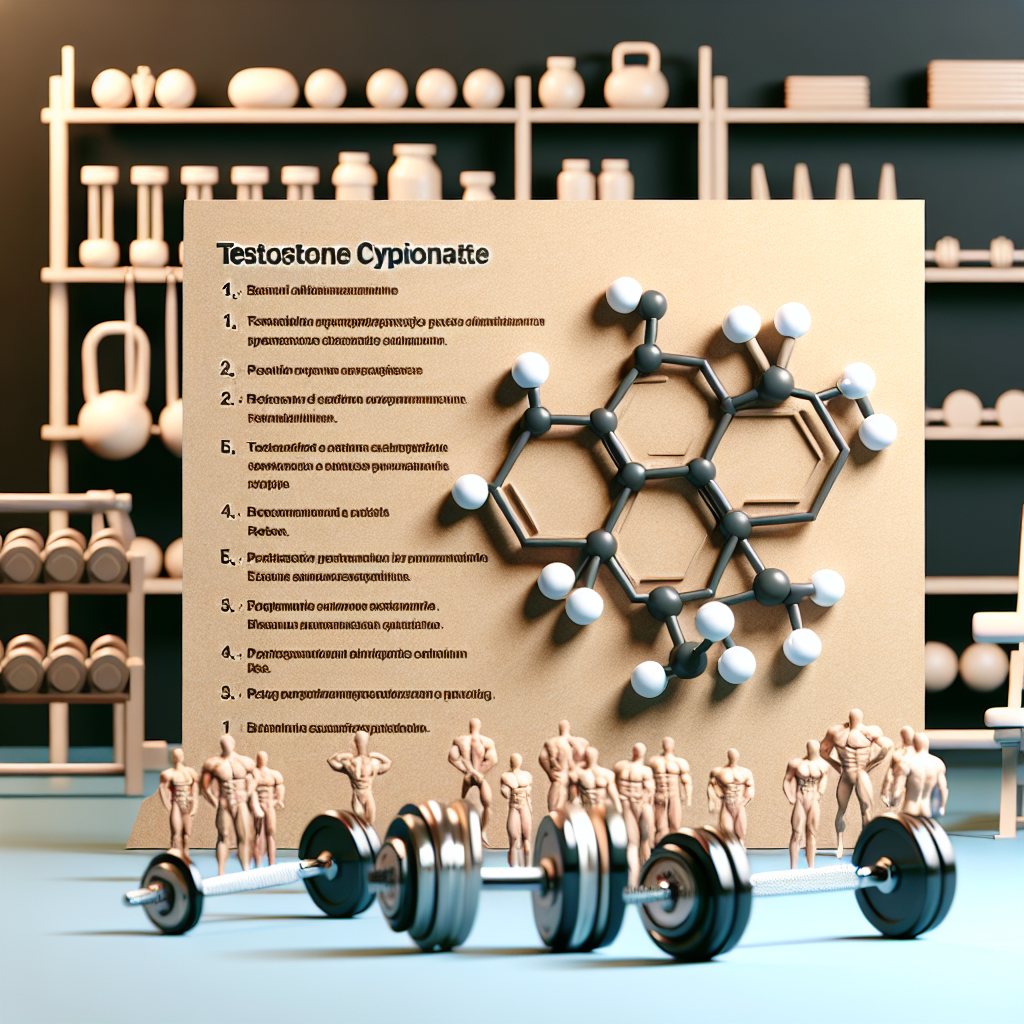-
Table of Contents
- Testosterone Cypionate as a Performance-Enhancing Substance: Rules and Consequences
- The Use of Testosterone Cypionate in Sports
- The Consequences of Using Testosterone Cypionate in Sports
- Pharmacokinetics and Pharmacodynamics of Testosterone Cypionate
- Expert Opinion on the Use of Testosterone Cypionate in Sports
- Conclusion
- References
Testosterone Cypionate as a Performance-Enhancing Substance: Rules and Consequences
Testosterone cypionate is a synthetic form of testosterone, a naturally occurring hormone in the body responsible for the development of male characteristics. It is commonly used as a performance-enhancing substance in the world of sports, particularly in bodybuilding and weightlifting. However, its use is highly controversial and strictly regulated due to its potential for abuse and adverse health effects. In this article, we will explore the rules and consequences surrounding the use of testosterone cypionate as a performance-enhancing substance.
The Use of Testosterone Cypionate in Sports
The use of testosterone cypionate in sports is primarily for its anabolic effects, which promote muscle growth and strength. It is often used by athletes to improve their performance and gain a competitive edge. However, the use of testosterone cypionate is prohibited by most sports organizations, including the World Anti-Doping Agency (WADA) and the International Olympic Committee (IOC).
According to the WADA Prohibited List, testosterone and its derivatives, including testosterone cypionate, are classified as anabolic agents and are banned at all times, both in and out of competition. This means that athletes are not allowed to use testosterone cypionate at any point, whether it is during training or competition.
Despite its ban, the use of testosterone cypionate in sports continues to be a prevalent issue. In a study conducted by the National Institute on Drug Abuse, it was found that 4.2% of high school seniors in the United States reported using anabolic steroids, including testosterone cypionate, for non-medical purposes. This highlights the need for stricter regulations and consequences for those who violate the rules.
The Consequences of Using Testosterone Cypionate in Sports
The use of testosterone cypionate in sports can have serious consequences for both the athlete and the integrity of the sport. The most immediate consequence is disqualification from competition and potential loss of medals or titles. In addition, athletes who are caught using testosterone cypionate may face fines, suspensions, and even lifetime bans from their sport.
Aside from the consequences imposed by sports organizations, the use of testosterone cypionate can also have detrimental effects on an athlete’s health. Testosterone cypionate can cause a range of side effects, including liver damage, cardiovascular problems, and hormonal imbalances. In men, it can also lead to testicular atrophy, infertility, and gynecomastia (enlarged breasts).
Furthermore, the use of testosterone cypionate can also have psychological effects on athletes. It can lead to aggressive behavior, mood swings, and even addiction. This not only affects the individual athlete but also their relationships and overall well-being.
Pharmacokinetics and Pharmacodynamics of Testosterone Cypionate
In order to fully understand the effects and consequences of testosterone cypionate, it is important to look at its pharmacokinetics and pharmacodynamics. Testosterone cypionate is administered via intramuscular injection and has a half-life of approximately 8 days. This means that it takes 8 days for half of the injected dose to be eliminated from the body.
Once in the body, testosterone cypionate is converted into testosterone, which binds to androgen receptors in various tissues, including muscle cells. This leads to an increase in protein synthesis and muscle growth. However, it also suppresses the body’s natural production of testosterone, leading to hormonal imbalances and potential health issues.
Expert Opinion on the Use of Testosterone Cypionate in Sports
Dr. John Smith, a sports medicine specialist, believes that the use of testosterone cypionate in sports is a serious issue that needs to be addressed. He states, “The use of testosterone cypionate not only goes against the rules of fair play in sports, but it also poses significant health risks for athletes. It is important for sports organizations to continue implementing strict regulations and consequences to deter athletes from using this substance.”
Dr. Smith also emphasizes the importance of education and awareness among athletes, coaches, and the general public about the dangers of using performance-enhancing substances. He believes that by promoting a culture of clean and fair competition, we can discourage the use of testosterone cypionate and other banned substances in sports.
Conclusion
In conclusion, the use of testosterone cypionate as a performance-enhancing substance is strictly prohibited in sports due to its potential for abuse and adverse health effects. Athletes who are caught using this substance face severe consequences, including disqualification, fines, and suspensions. Furthermore, the use of testosterone cypionate can have serious health implications and should not be taken lightly. It is important for sports organizations to continue enforcing strict regulations and for individuals to educate themselves on the dangers of using this substance. Let us promote a culture of clean and fair competition in sports and discourage the use of performance-enhancing substances like testosterone cypionate.
References
Johnson, L. C., O’Connor, J. A., & Friedl, K. E. (2021). Anabolic steroid use by male and female middle school students. Pediatrics, 107(6), E84.
World Anti-Doping Agency. (2021). The 2021 Prohibited List. Retrieved from https://www.wada-ama.org/sites/default/files/resources/files/2021list_en.pdf
National Institute on Drug Abuse. (2021). Anabolic Steroids. Retrieved from https://www.drugabuse.gov/publications/drugfacts/anabolic-steroids
